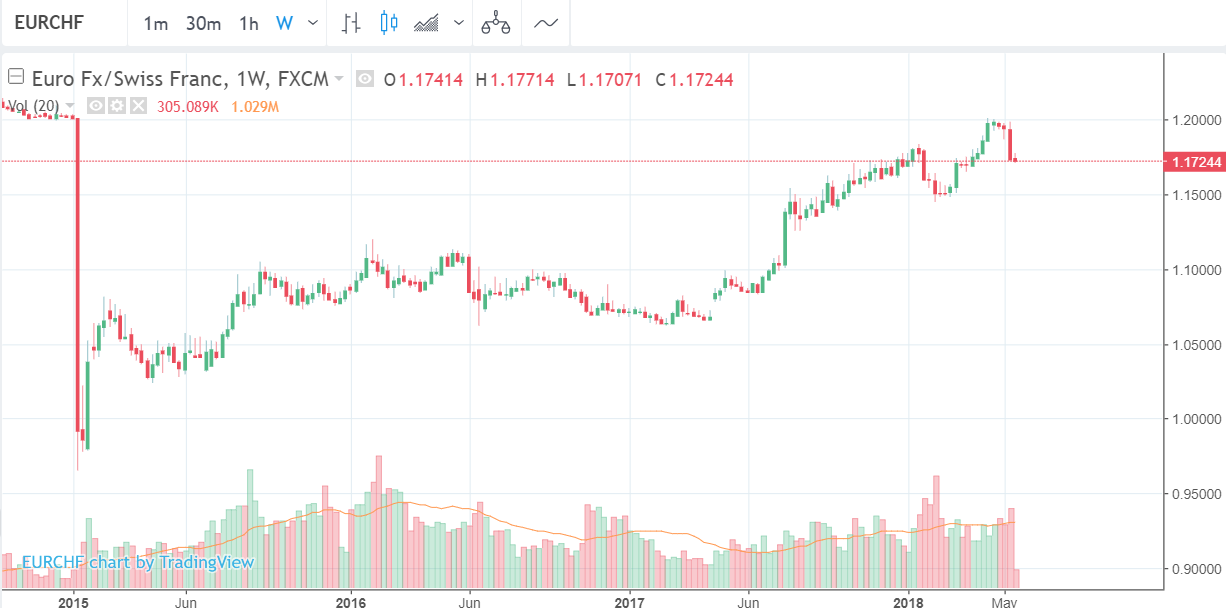EUR/CHF is Falling as New Factors Indicate Bullish Cycle May Be Starting For Franc
- EUR/CHF has weakened as a result of falling Eurozone growth expectations and increasing political risk
- The pair looks like it may reverse its medium-term uptrend, upending expectations of higher prices
- US equities look fragile and repatriation flows could drive CHF higher

© DragonImages, Adobe Stock
The Swiss Franc has strengthened much more than previously expected, and this has resulted in EUR/CHF falling to 1.1726 from its 1.2005 peak in April.
Now further arguments are marshaling to suggest more downside for the pair is likely in the future mainly due to the fresh Eurozone debt crisis in Italy and the impact of weak equity markets in the US.
In April, after rising up and touching the key 1.2005 level, analysts had expected the Euro-Franc rate to rise even further (the Franc to weaken).
Their conclusion was based mainly on analysis of the Swiss National Bank (SNB) who have pursued a weak Franc policy for years and were, therefore, unlikely to stand in the way of further weakness.
Record low unemployment and a robust economic outlook weren't likely to change the SNB's mind, especially as their balance sheet showed little change in FX deposits, suggesting they were not actively intervening in markets.
Switzerland's ultra-low -0.75% interest rate was a further negative factor for the Franc as foreign capital tends to prefer flowing to places where it can earn more not less interest.
Therefore, everything seemed set for EUR/CHF to break back above 1.20 and perhaps head up to 1.30, yet ultimately it failed and the exchange rate sank back down to the current 1.17s as the Euro weakened and the Franc started to appreciate.

Data showing slowing growth in the Eurozone in Q1 propelled the sell-off, and the news of the coalition forming in Italy from the two most Euroskeptic parties in Italian politics was a further blow as it revived fears of an Italexit.
The news of the coalition government also helped the Swiss Franc appreciate, as it increased safe-haven flows, of which the Franc is a major beneficiary.
"The growing likelihood of a Movement Five Star/League coalition government along with coded signals of EUR skepticism have provided a sharp reminder of the risks that remain. The net result has been that the EUR has fallen over 2% against the CHF and is already challenging the broad trend up from the time of the French presidential election," says Simon Derrick, chief strategist at BNY Mellon.
Derrick argues that the bearish extent of the declines during the sell-off over the last month are a negative indication suggesting a change of trend rather than a correction because they remind him of the Euro's steep declines during the height of the Eurozone debt crisis in 2010-11.
"Over the course of the past three years the price action in EUR/CHF has proved benign with low levels of realized volatility and barely any occasions when the EUR has fallen much more than 1% over the course of a day," says Derrick.
In contrast to this, the strong sell-off over the last month is more like that witnessed during the height of the crisis.
"It may, therefore, be worth remembering that realized volatility trended steadily higher through 2010 and the first half of 2011 and that this same period saw 35 days on which the EUR fell in excess of 1%," says the strategist.
Another factor in favour of a strengthening Franc is based on the relatively high ownership of US equities in Switzerland, most notably by the SNB itself. This fact in combination with the negative outlook for US equities could cause sudden surges in repatriation flows back into Francs as Swiss investors and the SNB bailout of US stocks and bring their money back home, according to dealers at LMAX foreign exchange brokers in London.
"The SNB will need to be careful right now, as its strategy to weaken the Franc could face headwinds from the US equity market," says LMAX.
"The record run in the US stock market has been a big boost to the SNB’s strategy with elevated sentiment encouraging Franc weakness. Of course, the SNB is no stranger to this risk, given a balance sheet with massive exposure to US equities," adds the broker.
"But any signs of a more intensified liquidation on that front in Q2 2018, will likely invite a very large wave of demand for the Franc, which will put the SNB in a more challenging position to weaken the Franc," they conclude.
LMAX see signs from the monthly chart of the S&P 500 Index that US equities may be rolling over in the long-term and could begin a more protracted bear-trend.
Rising interest rates are making the cost of borrowing more expensive for businesses and the rising price of oil as well as geopolitical trade risks are further headwinds to the stock market, which increase the chances of more downside in equities, and upside for CHF.
Get up to 5% more foreign exchange by using a specialist provider to get closer to the real market rate and avoid the gaping spreads charged by your bank when providing currency. Learn more here.
